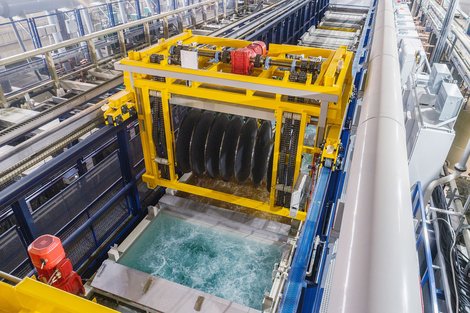As part of the energy transition, many companies would like to use green hydrogen, i.e. hydrogen produced with renewable energies, as an energy source. But the industry still lacks electrolyzers to produce the sustainable fuel.
Sunfire GmbH, a global leader in electrolysis headquartered in Dresden, Germany, is meeting this demand and experiencing a real boom: Since 2010, the workforce has grown from three employees at the Dresden headquarters to more than 500 at several locations in Germany and Switzerland.
In NRW, Sunfire has been electroplating cells automatically at its Solingen site since the beginning of March 2023. The metallic coating of the cells is the most important step in making electrolyzers more efficient and more robust. This will facilitate the series production of alkaline electrolyzers. These produce hydrogen from water using electric current. The company invested around 30 million euros in expanding the site in the Klingenstadt for this purpose.
According to Sunfire, cells with a capacity of 250 MW can be coated annually in Solingen. Another plant with a capacity of 500 MW is under construction. It is scheduled for completion before the end of 2023. In total, capacities for 1,000 MW, or one gigawatt, are planned.
At the inauguration of the expanded electroplating plant, NRW Economics and Climate Protection Minister Mona Neubaur emphasized: "Today's plant opening to mark the start of Sunfire's electrolyzer series production is an important milestone for the ramp-up of the hydrogen economy in Germany and North Rhine-Westphalia. With the construction and commissioning of a new electroplating production line for electrolytic cells in Solingen, we are demonstrating that North Rhine-Westphalia possesses key qualifications and expertise for future technologies. The Solingen plant, which used to manufacture primarily for the mining industry, is thus being made fit for the future and is a great example of how traditional companies are finding a promising business model in the hydrogen sector."


